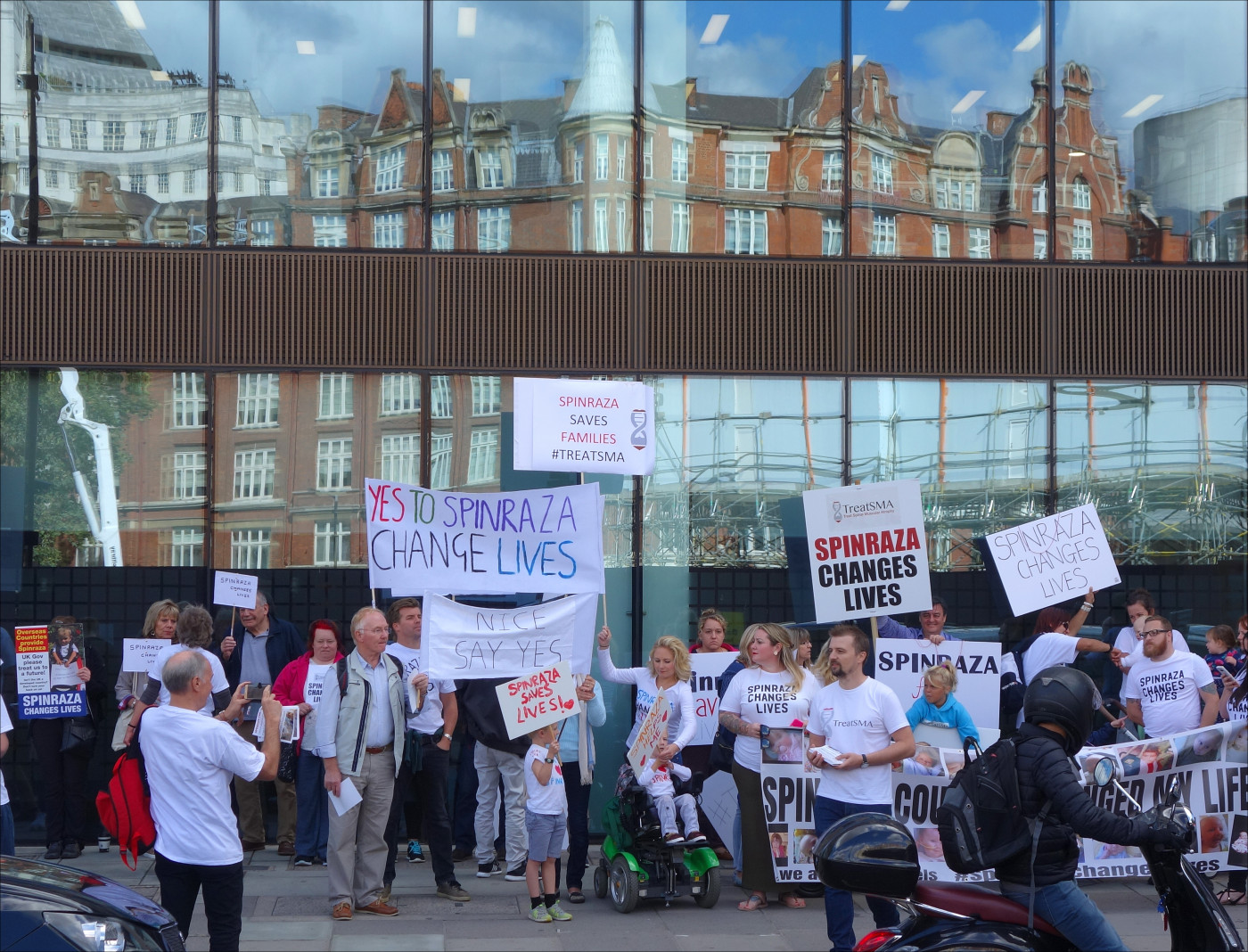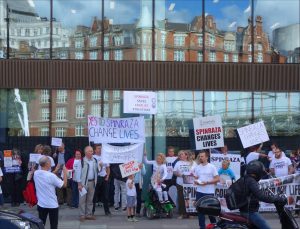In UK and Ireland, SMA Patients Demand Reimbursement for Spinraza

SMA families in London demand access to Spinraza. (Photo courtesy of Kacpar Rucinski)
A drug appraisal committee of Britain’s National Institute for Health and Care Excellence (NICE) met in Manchester, England, for the third and final time March 6 to decide whether to recommend Spinraza (nusinersen) for the treatment of spinal muscular atrophy (SMA).
Several hundred demonstrators organized by the nonprofit group TreatSMA staged a protest on the steps of NICE’s headquarters before the meeting.
“SMA is a cruel disease that puts an immense burden on families, and Spinraza is an incredibly effective drug that greatly reduces the burden,” TreatSMA states on its website. “The future of treating spinal muscular atrophy in our country now hinges on the committee’s decision. We are well aware that NICE might wish to exclude some people with SMA from accessing the treatment.”
The meeting follows a draft recommendation issued last September against adding Spinraza to the subsidized public health system of England and Wales because of its “extremely high cost.” At that time, the committee had concluded that, based on its list price, Spinraza’s annual cost-effectiveness ranged between £400,000 and £600,000 (about $524,000 to $786,000) per Quality Adjusted Life Year (QALY) gained, making it too expensive for it to be considered a cost-effective use of resources by the National Health Service (NHS).
Are you on Spinraza? Join our forums and share your experience with other patients and caregivers.
The organization added: “TreatSMA will keep representing everyone’s voice. In these decisive moments, we stand united in our right to access effective therapies on the NHS.”
The March 6 meeting in Manchester “is the final piece of the puzzle,” said Doug Henderson, managing director, SMA UK.
“They haven’t rejected Spinraza. What NICE did is ask for more information; it’s an extension. Biogen submitted the information, and we hope they’ve got enough now to give it a green light,” Henderson told SMA News Today, estimating that a final decision would be announced four to five weeks later.
“It’s very disappointing,” he said. “This is taking too long. It’s a death sentence for kids if they can’t get something in the end.”
Should England follow Scottish example?
Henderson said that anywhere from 800 to 1,400 people in Britain are living with the disease at any given time, with 70 to 75 new patients being diagnosed annually. Yet Biogen’s Expanded Access Program, which enabled patients to obtain the expensive drug for free, closed in November, with only 80 or so patients benefiting from it, he said.
In Scotland, he said, “Spinraza will now be refunded retroactively, while England, Wales and Northern Ireland are still waiting. It’s a very unusual situation. We hope that England looks at the Scottish scheme and copies it, because this is what needs to happen for rare diseases.”
Kacpar Rucinski, founder of Poland’s Fundacja SMA and a board member of SMA Europe, a U.K.-based umbrella group, said he expects NICE to recommend reimbursement of Spinraza for SMA types 2 and 3.
“But type 1 is a big unknown because these cases are not as cost-effective. The treatment doesn’t reduce care costs statistically,” he said.
Last December, Poland’s Ministry of Health approved reimbursement of Spinraza, but only after a long fight that involved an intense media campaign and online petition organized by Rucinski’s Warsaw-based foundation. At present, 24 of the European Union’s 28 member nations have now agreed to reimburse for Spinraza; the remaining holdouts are Estonia, Ireland, Latvia, and the United Kingdom.
“In Poland, the health minister [makes] the final decision. In the U.K., the [Health Technology Assessment] determines whether the drug will be reimbursed or not. NICE does precise analysis of trial data, calculating cost-effectiveness using QALY,” Rucinski said. “So for them, there is not enough data — especially long-term data — combined with a very high price, to recommend use of the drug. NHS England’s position is they don’t provide treatments that aren’t cost-effective.”
Meanwhile, protests over SMA reimbursement have also broken out in Ireland — though they are unrelated to the ongoing deliberations by NICE.
“We are as separate from England as France is, but lots of politicians in Ireland don’t understand what the problem is,” said Anton Mannering, father of an 11-year-old boy, Jordan, with SMA type 2. “The government has tried to take itself out of the process so they can say it’s not their responsibility.”
Ireland won’t pay for Spinraza
Mannering helped organize Ireland’s first SMA-related protest last September at the Irish Parliament in Dublin. On Feb. 28, Rare Disease Day, his group staged an even bigger rally, attracting more than 300 people.
In a Feb. 21 letter to Mannering’s group, the Irish government’s Health Services Executive said it would not reimburse for Spinraza at the current price offering, which it said was €600,000 (about $678,000) per patient for the first year and €380,000 (about $430,000) a year thereafter — translating into “an estimated budget impact in excess of €20 million (about $22.6 million) over a five-year period.”
But a Biogen official confirmed in a March 1 letter to Mannering that “the figures quoted by HSE are six months out of date,” yet that “due to the confidential nature of ongoing negotiations, Biogen cannot comment further on the discussions we are having with HSE regarding pricing.”
That led Mannering to suspect that Irish government officials are “being selective with the truth,” he says.
“It may be that for commercial reasons, Biogen wants to officially keep the price at €600,000. But we believe that the effective cost on a per-patient basis — based on conversations I’ve had with other people at SMA Europe — would be at least 50 percent less than that,” Mannering said, adding: “I find it very unlikely that a pharmaceutical company would say something like that about numbers coming from a government agency if it wasn’t true. It would be completely against their interests to do so.”
He pointed out that Ireland — home to an estimated 70 people with SMA — has one of the highest per-capita incomes in Europe, and the eighth-best performing economy worldwide, according to the World Economic Forum. Yet it refuses to reimburse for Spinraza even as much poorer EU member states such as Poland have agreed to do it.
“The new children’s hospital in Dublin will cost over €2 billion, making it the most expensive hospital in the world,” he said. “That’s reality. It’s happening right now, and it’s a national scandal.”









